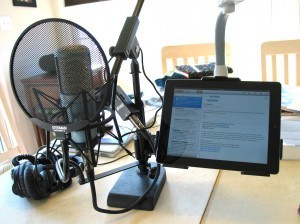Technology Changes – It’s Content That Matters
 I have seen a lot of technological change in my time. Contrary to the stereotype that people my age (I am 63) don’t get technology or know how to use it, I embrace it. At least the parts that are useful to me. I think the reason is that I remember how primitive things were when I was younger. Do you really think my generation wouldn’t have been excited about an iPod or an iPad? Think again.
I have seen a lot of technological change in my time. Contrary to the stereotype that people my age (I am 63) don’t get technology or know how to use it, I embrace it. At least the parts that are useful to me. I think the reason is that I remember how primitive things were when I was younger. Do you really think my generation wouldn’t have been excited about an iPod or an iPad? Think again.
That’s the perspective from which I observe online discussions about ‘real’ books vs ebooks or CDs and vinyl vs. various digital formats. Before we get into one of those usually heated discussions let me say up front that I don’t really care what you prefer to use. ‘Use it in good health,’ as the saying goes. Over six decades I have acquired a lot of books and music in a variety of formats. In terms of utility, however, newer technologies have certain advantages over previous ones. The less convenient the format the less likely I am to use it.
Let’s talk about books. I like old style books as well as anyone but they quickly become a liability. Not long ago I had to add one more bookcase in the last possible place where it would fit (the piles of books on the floor were a tripping hazard). I suppose I could have weeded out older volumes to make room but, like attempting to create a household inventory, the task quickly becomes a pain. Therefore, recently I have been buying a lot more books in Kindle format. But not all – it depends on what I want them for. For example, books on art work best in paper format (at least thus far). For research purposes ebooks win out over paper.
Let’s say I need to find a quote or a fact but I don’t remember where I saw it. Ebooks have search functions. Let’s also say that I want to find every instance of a particular topic throughout a book. My Kindle app will list the results. I find an unfamiliar word or phrase? Ebooks give me instant access to online dictionaries and search tools that I can use ‘on the fly.’ I want to bookmark or highlight items? No problem. Creating notes? Easy. I want to download a map? A well designed ebook will allow that. Then there is the capacity to include sound and video files. Am I willing to sacrifice this utility for the frequently asserted supposed aesthetic appeal of the ‘smell and feel’ of paper books? Not a chance. And I can store hundreds of these highly useful ebooks on my highly transportable iPad.
I am typing this on a laptop but I could just as easily be doing it on my iPad. My iPad is the single most useful tool I have owned to date. That does not mean that it is a perfect tool or that I consider myself an unthinking Apple acolyte. But, with the addition of a  few accessories, a range of uses become possible. For example, together with my Zagg combined keyboard and case, it makes a compact and portable workstation. An Apple camera connector allows me to connect a USB microphone for podcasting and spoken word recording. Or, if I want to use one of my studio quality condenser microphones, I can connect it using a handy device such as the iRig PRE.
few accessories, a range of uses become possible. For example, together with my Zagg combined keyboard and case, it makes a compact and portable workstation. An Apple camera connector allows me to connect a USB microphone for podcasting and spoken word recording. Or, if I want to use one of my studio quality condenser microphones, I can connect it using a handy device such as the iRig PRE.
If you don’t like iPads use something else. My point is that we need to stop letting our attitudes to a particular technology get in the way of finding creative ways to use it. Going back to those online discussions about the merits of older technologies, the participants often seem to be missing the point. Change is constant. While you are complaining about a particular technology it is already being replaced. I think that many people find this intimidating and, instead of trying to adapt, make a virtue out of older technologies. Or say that they do.
I am involved in a number of creative pursuits and collaborate on projects with other people. My focus is on learning the new skills I need to keep up, not looking backward to out of date methods that, frankly, are not as great as some claim them to be. Ease of use and the ability to quickly manipulate content is very important. There is, however, one aspect of technological change that I am forced to pay attention to, if only for pragmatic reasons. As a content creator I need to assess where most of the potential audience are at in the technology spectrum. It is important to make sure that my work is available in the formats that people are currently using.
I am not nostalgic about the past. I was a child in the 1950s, a teenager in the 1960s. I do not consider either decade a halcyon time (except for the soundtrack). What was available to us suffered from the limits of technology at the time. That is no less true today. I have gone from 78 rpm records to iPods. I remember once in the 1960s, probably when I was fiddling with a stylus gauge, my father telling me that I spent more time adjusting the stereo than listening to it. He was right, of course. It’s about the content.
I am a writer, podcaster and staff member at Podioracket.com.
I used my iPad rig to record the role of Dr. Andrew MacGillivray in the dramatic podcast Black Magic, written and produced by Dan Shaurette.



